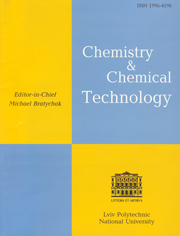Optimization of Epoxidation Palm-Based Oleic Acid to Produce Polyols
| Attachment | Size |
|---|---|
| 417.9 KB |
[1] Taude, Saurabh; Patnaik, M.; Bhagt, S.L.; Renge, V.C. Epoxidation of Vegetable Oils: A Review. Int. J. Adv. Eng. Technol. 2011, II, 491-501.
[2] Bauman, Z.A. Natural History of Evil; Polity Press, 2011.
[3] Hong, L.K.; Yusop, R.M.; Salih, N.; Salimon, J. Optimization of the in-situ Epoxidation of Linoleic Acid of Jatropha Curcas Oil with Performic Acid. Malaysian J. Anal. Sci. 2015, 19, 144-154.
[4] Lu, H.; Sun, S.; Bi, Y.; Yang, G. Enzymatic Epoxidation of Biodiesel Optimized by Response Surface Methodology. African J. Biotechnol. 2012, 11, 12356-12363. https://doi.org/10.5897/AJB11.3831
https://doi.org/10.5897/AJB11.3831
[5] Khoon Poh, A.; Choy Sin, L.; Sit Foon, C.; Cheng Hock, C. Polyurethane Wood Adhesive from Palm Oil-Based Polyester Polyol. J. Adh. Sci. Technol. 2014, 28, 1020-1033. https://doi.org/10.1080/01694243.2014.883772
https://doi.org/10.1080/01694243.2014.883772
[6] Hatchett, D.W., Kodippili, G., Kinyanjui, J.M.; Benincasa, F.; Sapochak, L. FTIR Analysis of Thermally Processed PU Foam. Polym. Degrad. Stab. 2005, 87, 555-561. https://doi.org/10.1016/j.polymdegradstab.2004.10.012
https://doi.org/10.1016/j.polymdegradstab.2004.10.012
[7] Alagi, P.; Ghorpade, R.; Jang, J.H.; Patil, C.; Jirimali, H.; Gite V.; Hong, S.C. Functional Soybean Oil-Based Polyols as Sustainable Feedstocks for Polyurethane Coatings. Ind. Crops Prod. 2018, 113, 249-258. https://doi.org/10.1016/j.indcrop.2018.01.041
https://doi.org/10.1016/j.indcrop.2018.01.041
[8] Boustead, I. Eco-profiles of the European Plastics Industry: Polyether Polyol.; a Report for Plastics Europe; PlasticsEurope: Brussels, March 2005.
[9] Santacesaria, E.; Tesser, R.; Di Serio, M.; Turco, R.; Russo, V.; Verde, D. A biphasic Model Describing Soybean Oil Epoxidation with H2O2 in a Fed-Batch Reactor. Chem. Eng. J. 2011, 173, 198-209. https://doi.org/10.1016/j.cej.2011.05.018
https://doi.org/10.1016/j.cej.2011.05.018
[10] Jalil, M.J.; Mohamed, N.; Jamaludin, S.K.; Som, A.M.; Mohamad Daud, A.R. Epoxidation of Palm Kernel Oil-Based Crude Oleic Acid. Adv. Mater. Res. 2014, 906, 125-130. https://doi.org/10.4028/www.scientific.net/AMR.906.125
https://doi.org/10.4028/www.scientific.net/AMR.906.125
[11] Derawi, D.; Salimon, J. Optimization on Epoxidation of Palm Olein by Using Performic Acid. J. Chem. 2010, 7, Article ID 384948. https://doi.org/10.1155/2010/384948
https://doi.org/10.1155/2010/384948
[12] Rama Rao, S., Padmanabhan, G. Application of Taguchi Methods and ANOVA in Optimization of Process Parameters for Metal Removal Rate in Electrochemical Machining of Al/5%SiC Composites. Int. J. Eng. Res. 2012, 2, 192-197.
[13] Amini, M.; Younesi, H.; Bahramifar, N.; Zinatizadeh, A.A.; Ghorbani F.; Daneshi, A.; Sharifzadeh, M. Application of Response Surface Methodology for Optimization of Lead Biosorption in an Aqueous Solution by Aspergillus Niger. J. Hazard. Mater. 2008, 154, 694-702. https://doi.org/10.1016/j.jhazmat.2007.10.114
https://doi.org/10.1016/j.jhazmat.2007.10.114
[14] Kim, H.K.; Kim J.G.; Cho J.D.; Hong J.W. Optimization and Characterization of UV-Curable Adhesives for Optical Communications by Response Surface Methodology. Polym. Test. 2003, 22, 899-906. https://doi.org/10.1016/S0142-9418(03)00038-2
https://doi.org/10.1016/S0142-9418(03)00038-2
[15] Muthukumar, M.; Mohan, D.; Rajendran, M. Optimization of Mix Proportions of Mineral Aggregates Using Box Behnken Design of Experiments. Cem. Concr. Compos. 2003, 25, 751-758. https://doi.org/10.1016/S0958-9465(02)00116-6
https://doi.org/10.1016/S0958-9465(02)00116-6
[16] Dinda, S.; Patwardhan, A.V.; Goud, V.V.; Pradhan, N.C. Epoxidation of Cottonseed Oil by Aqueous Hydrogen Peroxide Catalysed by Liquid Inorganic Acids. Biores. Technol. 2008, 99, 3737-3744. https://doi.org/10.1016/j.biortech.2007.07.015
https://doi.org/10.1016/j.biortech.2007.07.015
[17] Lee, P.L.; Wan Yunus, W.M.Z.; Yeong, S.K.; Dzulkefly Kuang, A.; Lim, W.H. Optimization of The Epoxidation of Methyl Ester of Palm Fatty Acid Distillate. J. Oil Palm Res. 2009, 21, 675-682.
[18] Derouet D. and Brosse J.: Comparative Study of The Epoxidation of Natural and Synthetic Rubber Latices. J. Rubb. Res., 2006, 9 (1), 1-20.
[19] Statistik Indonesia 2014; Katalog BPS, Vol. XXXIII, No.2, pp 81-87.
[20] Mushtaq, M.; Tan, I.M.; Nadeem, M.; Devi, C.; Lee, S.Y.C.; Sagir M.; Rashid, U. Epoxidation of Methyl Esters Derived from Jatropha Oil: An Optimization Study. Grasas y Aceites, 2013, 64, 103-114. https://doi.org/10.3989/gya.084612
https://doi.org/10.3989/gya.084612
[21] Fong, M.N.F.; Salimon, J. Epoxidation of Palm Kernel Oil Fatty Acids. J. Sci. Technol. 2012, 4, 87-98. Retrieved from https://penerbit.uthm.edu.my/ojs/index.php/JST/article/view/605
[22] Jalil, M.J.; Jamaludin, S.K; Rafizan, A.; Daud M. Degradation Oxirane Ring Kinetics of Epoxidized Palm Kernel Oil-Based Crude Oleic Acid. Chem. Chem. Technol., 2018, 12, 296-299. https://doi.org/10.23939/chcht12.03.296
https://doi.org/10.23939/chcht12.03.296










